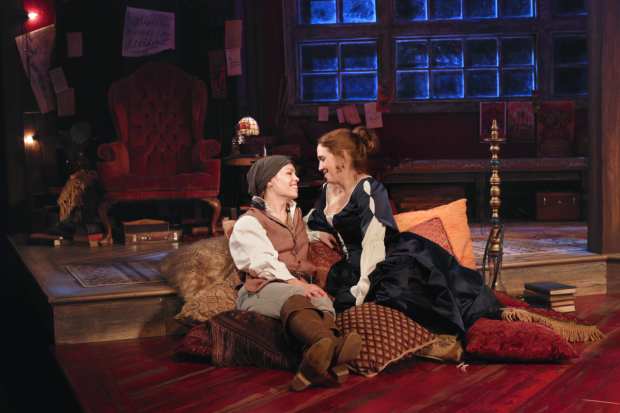
(© Grace Toulotte)
Or, at Round House Theatre is a delicious comedic riff on 17th-century England. It uses facts liberally and honestly, taking place in 1667, at the end of the oppressive era of Oliver Cromwell and the start of the Restoration, which allowed theaters to flourish and the monarchy to return. Aphra Behn, a poet and former spy for King Charles II in his wars against the Dutch now wants to do nothing more than write honest plays about how people live and love. Playwright Liz Duffy Adams turns those facts inside out by having only three actors play seven roles, flipping the production into a blend of door-slamming bedroom farce and lightning fast quick-change artistry.
Or, begins with Aphra Behn in debtors' prison, frantically writing with a quill pen and running out of ink. Her jailer grumbles about having to wait on her with no recompense until Aphra wisely convinces him that if she does not have ink, she cannot write to her mentor to plead for the money he owes her: hence, no tip for the jailer. After the jailer leaves to find her ink, Aphra is visited by a masked man who looks vaguely familiar to her. When he removes the mask, Aphra is astonished to find that it is King Charles II, who tries to make love to her. But when she begs off in order to continue writing, he opens the door and sets her free.
The scene then shifts to a marvelous garret into which Aphra has moved in order to write in peace. All goes well until she is interrupted by a sprightly young man whom she eventually realizes is actually a sprightly young woman, the actress Nell Gwynne. The two become best friends until Aphra's home is invaded by her former acquaintance, William Scott, a Dutch spy whom Aphra once tried to turn into a double agent. She is also visited again by King Charles, who takes a liking to Nell.
The plot complications are fast and furious and the three actors are top-notch performers. Holly Twyford's Behn keeps the plot charging in the right direction. Half of her physical skill is in her ability to speed across the stage and slam her back against a door, making sure certain characters don't bump into each other when the plot calls for them to be concealed. She manages to do all of this while still seeming calm, cool, and collected.
Gregory Linington is brilliant as the jailer, Charles II, and William Scott. Some of his changes of character are breathtakingly swift, and each time Linington changes not only his costumes, but his personality changes as well. Erin Weaver is equally delightful as Nell Gwynne, the maid Maria, and Lady Davenant. The small-statured Weaver almost flies around Behn's garret, spouting her philosophy of freedom from constraint. She hilariously converts to a woman at least a foot taller than herself when she straps on high boots to play the imposing Mrs. Davenant, a popular Restoration actress, who demands a new play from Behn.
Director Aaron Posner finds just the right fast tempo for this comedy. The appearances of Linington as Charles II and then suddenly as Scott are priceless. The overwhelming presence of Mrs. Davenant is an excellent example of how history can be effective even when inaccurate. Scenic designer Paige Hathaway's first act in the prison takes place before a curtain, where Behn's writing table is the only set piece. When the curtain opens up for Act 2, it reveals the mammoth garret full of books, drawings, sofas, chairs, a large wooden armoire, and a wall of windows. Costume designer Kendra Rai outfits Behn in a long, blue and white silk, 17th-century lace-up gown and some interesting footwear that is revealed when she gets down to writing.
Although it plays with history and the social, sexual, religious, and political changes of the time, Or, is anything but a history play. It shows people at their best and their worst, trying to survive life and trying to enjoy it. Round House's production gives it just the right touches of wit and hilarity to serve as a reminder that that's not far afield from what Behn tried to do centuries ago.








